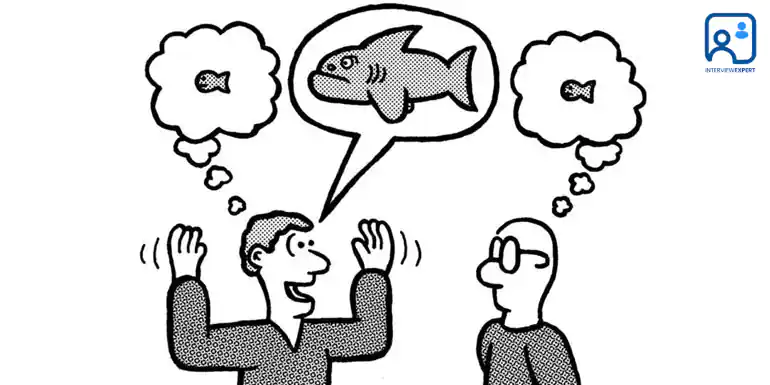
Being honest and genuine at a job interview is crucial now more than ever in the age where information is at our fingertips. It's getting harder to get away with lying or making up facts since employers are checking references and validating the data that candidates submit. Being open and honest throughout the interview process can also exhibit the reliability and integrity that employers seek in employees.
Many job seekers find the interview process to be a frightening ordeal. It might be simple to feel as though you need to embellish or exaggerate your qualifications in order to stand out from the competition—from refining your résumé to getting ready for difficult inquiries.
The reality is that honesty and openness are essential for getting a job and developing a successful career.
In this post, we'll examine the value of openness in job interviews and the reasons it's crucial for applicants to be sincere and genuine throughout the process. We'll look at the dangers and repercussions of lying as well as the advantages of truthfulness and openness. You will comprehend the importance of being sincere and genuine during a job interview at the end of this essay, and you will have tips and techniques for showcasing those traits to prospective employers.
Why is an interview important?
Prior to learning why you should never exaggerate and lie in a job interview. Understanding the idea of interviews is crucial. It's a formal conversation between you and a potential employer in which you try to emphasise your best qualities and persuade them that you are qualified for the job. Like a first date, there are feelings of trepidation, excitement, and even some sweating.
During an interview, you will typically be asked a variety of questions about your qualifications, experience, and skills. The purpose of the interview is for the interviewer to get to know you better personally and assess if you have the knowledge and abilities necessary to succeed in the role. It is your responsibility to never exaggerate and lie in a job interview.
Interviews can take on a variety of forms depending on the organisation and function. Some are conducted face-to-face, allowing you the chance to meet and personally get to know your potential employer. Others might be conducted through telephone or video conferencing tools, which can be more useful but also more difficult to use.
During the interview, you might introduce yourself and highlight your qualifications. You have the chance to persuade the hiring manager that you might be the best applicant while also showcasing your enthusiasm for the role and the company.
An interview can help you learn more about the position and the company, as well as determine whether it aligns with your values and career goals.
The Power Of Transparency In Job Interviews: Why A Candidate Should Not Tell Lie During A Job Interview
Why Should a Candidate Not Tell a Lie During A Job Interview?
Candidates for a position run a high risk when they lie during an interview. The consequences of lying can take many different forms, and none of them are good.
Lying can harm a candidate's credibility and reputation. If a candidate is discovered to have been dishonest, it's likely that both the company they are applying to and their industry will take a negative view of them. Because word-of-mouth spreads quickly and dishonesty has the potential to go viral, it may be challenging for the applicant to land a job in the future.
Lying may result in termination from the position. Numerous businesses run background checks and confirm the information provided by applicants; if discrepancies or lies are found, it's likely that the applicant will be eliminated from consideration for the position.
Lies can result in subpar work performance. An applicant who is employed on the basis of misleading information might not have the qualifications or experience needed to do the job well. This could result in subpar work output, which might eventually lead to dismissal or a bad recommendation from the company.
There may be legal implications for lying. In order to land a job, a candidate may be engaging in fraud if they lie about their credentials or work history. If this happens, they may face legal repercussions. Candidates should be receptive to suggestions and frank criticism. Candidates that are sensitive to criticism and eager to learn and develop are valued by employers. Candidates must be open to share their areas of improvement and show that they are eager to work on them.
Candidates should be prepared to talk about their ambitions and aims. Employers want to work with applicants that are driven and are certain of their career goals. Candidates should be ready to talk about their long-term objectives and their strategies for achieving them.
Candidates ought to be authentic. It can be alluring to put on a front during a job interview, but it's crucial to keep in mind that companies want applicants who are genuine and true. Doing this helps you to understand why you should never exaggerate and lie in a job interview.
Benefits of Never Exaggerate And Lie In A Job Interview
Even while it could seem like a simple way to get a job, it's crucial to keep in mind that companies place a high importance on honesty and authenticity. Being sincere and open during a job interview has several advantages. By evaluating the benefits we can get a better picture of why a candidate should never exaggerate in a job interview.
Integrity fosters trust. Being honest throughout the interview process might help establish the trust that employers are looking for in candidates. Candidates can demonstrate to potential employers that they are dependable and have integrity by being open and honest about their education, work history, and talents.
Honesty shows awareness of oneself. Candidates who are candid about their advantages and disadvantages demonstrate self-awareness and a realistic assessment of their skills. Employers may view this as a positive quality since they reward workers who are receptive to criticism and eager to learn.
Honesty can result in improved work performance. A applicant is more likely to get hired for a position that is a suitable fit for their talents and experience when they are open and honest about their education and work history. Better job performance and job happiness may result from this, which may ultimately be advantageous to both the employee and the employer.
Honesty can help you grow in your career. Employers reward individuals with honesty and integrity, therefore this can result in chances for career progress. Employees can establish a reputation for being dependable and trustworthy throughout their careers by acting honestly and openly, which may lead to more opportunities and promotions.
Final Thoughts On - Why Should a Candidate Not Tell a Lie During A Job Interview
It is impossible to stress the importance of transparency in job interviews. Even while it may be tempting to embellish or lie in order to come out as more knowledgeable or competent, the risks and negative effects of lying outweigh any potential advantages. Being upfront and honest during the interview process can foster trust, show self-awareness, improve job performance, and eventually open doors to career progression prospects.
Employers admire candour and genuineness. Candidates for jobs should keep in mind that being honest is always the best course of action and that the greatest approach to stand out during the interview process is to just be yourself.
Hope you like reading this article on - Why a candidate should never exaggerating in a job interview. If you have any queries or questions, you can reach out at info@interview-expert.com.
For more guidance on interview preparation, contact Interview Expert.

